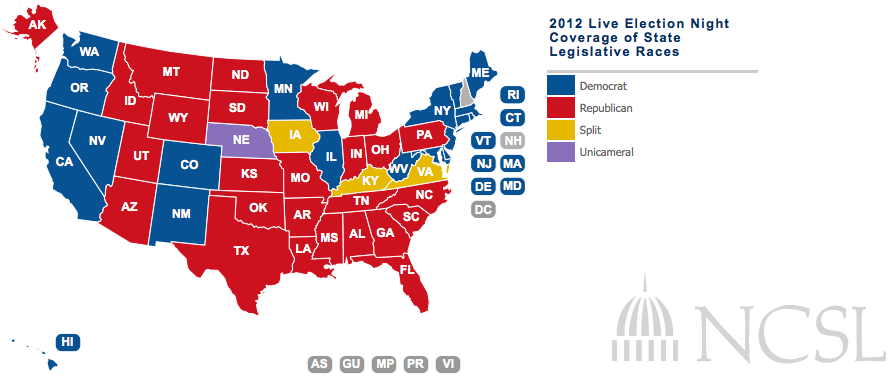GOP's takeover of Arkansas legislature boosts party's control in the South (updated)

Among the most hotly contested races in this year's election was the battle for partisan control of the Arkansas legislature -- and Republicans appear to have emerged as the victors, poised to take taking control of both the state House and Senate for the first time since post-Civil War Reconstruction.
The GOP captured the Arkansas Senate by 21 to 14. They also control the state House by 50 to 49, with one race not yet called but with the Republican holding a 45-vote margin. (Update: On Nov. 8, it was confirmed that the GOP won the 51st House seat, taking control of the chamber.) Until this election, Democrats controlled the Arkansas legislature continuously since 1874.
With the Arkansas statehouse a dot of blue in a sea of Southern red, this year's state legislative races attracted a lot of attention -- and money.
Americans for Prosperity, a conservative outside spending group backed by billionaires Charles and David Koch of the Kansas-based Koch Industries petrochemical conglomerate, had pledged to spend $1 million in the state, where every legislative seat was up for grabs for the first time in a decade. AFP focused its efforts against about a dozen Democrats who supported a proposed ballot measure to raise the tax on diesel fuel. Koch has business interests in Arkansas, including a paper plant run by its Georgia-Pacific subsidiary.
In response, the Democratic Legislative Campaign Committee planned to spent more than $500,000 in the state. But that was not enough to stop the AFP juggernaut, which went beyond a media campaign to also recruit volunteers for phone banks and neighborhood canvassing. AFP was also involved in Arkansas' May primary, mobilizing conservatives to defeat two moderate Republican state senators.
The big GOP win in Arkansas puts the party more firmly in control of Southern legislatures. In the 13 Southern states*, Democrats control only the Kentucky House and the West Virginia House and Senate. In Virginia, where legislative seats were not up for a vote this election, the Republicans control the House while the Senate is deadlocked 20-20, with the tie-breaking vote going to Republican Lt. Gov. Bill Bolling. There were also no legislative elections this year in Republican-controlled Alabama, Mississippi and Louisiana.
Arkansas was one of eight states where partisan control of the legislature changed this election. Alaska and Wisconsin, where control was previously split between the two major parties, went Republican. Colorado, New York and Oregon, also previously split, went to the Democrats, as did formerly Republican Maine and Minnesota.
In some Southern states, the Republicans strengthened their legislative control, thanks in no small part to GOP-controlled redistricting efforts. In Tennessee, for example, the Republican Party won a supermajority in both chambers. The GOP also won supermajority status in North Carolina, which also elected a Republican governor for the first time in 20 years -- former Charlotte Mayor Pat McCrory.
Meanwhile, Republicans maintained their overwhelming majorities in the legislatures of Florida, Georgia, South Carolina and Texas.
Once dubbed the "Solid South" for its firm Democratic voting patterns, the region's legislative map is increasingly looking solid red.
* Facing South counts among the Southern states Alabama, Arkansas, Florida, Georgia, Kentucky, Louisiana, Mississippi, North Carolina, South Carolina, Tennessee, Texas, Virginia and West Virginia.
(Map from the National Conference of State Legislatures. For a larger version, click here.)
Tags
Sue Sturgis
Sue is the former editorial director of Facing South and the Institute for Southern Studies.
